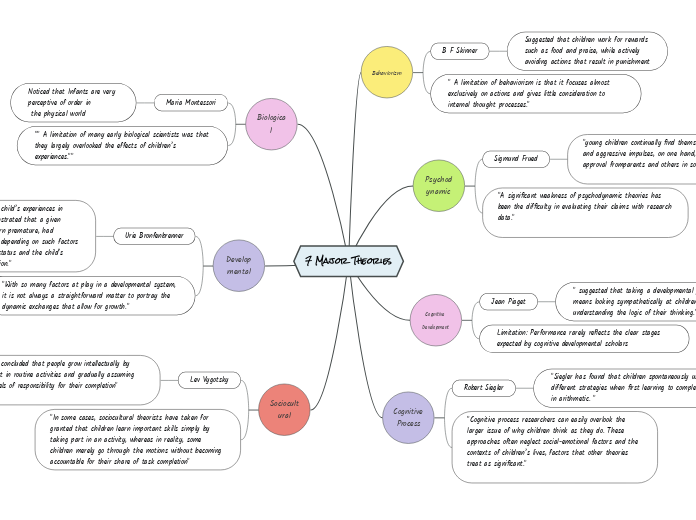7 Major Theories
Behaviorism
B F Skinner
Suggested that children work for rewards
such as food and praise, while actively
avoiding actions that result in punishment
" A limitation of behaviorism is that it focuses almost exclusively on actions and gives little consideration to internal thought processes."
Psychodynamic
Sigmund Frued
"young children continually find themselves tornby sexual and aggressive impulses, on one hand, and desires to gain approval fromparents and others in society, on the other "
"A significant weakness of psychodynamic theories has been the difficulty in evaluating their claims with research data."
Cognitive Development
Jean Piaget
" suggested that taking a developmental perspective means looking sympathetically at children and understanding the logic of their thinking."
Limitation: Performance rarely reflects the clear stages expected by cognitive developmental scholars
Cognitive Process
Robert Siegler
"Siegler has found that children spontaneously use several different strategies when first learning to complete tasks in arithmetic. "
"Cognitive process researchers can easily overlook the larger issue of why children think as they do. These approaches often neglect social-emotional factors and the contexts of children’s lives, factors that other theories treat as significant."
Biological
Maria Montessori
Noticed that Infants are very
perceptive of order in
the physical world
"" A limitation of many early biological scientists was that they largely overlooked the effects of children’s experiences.""
Developmental
Urie Bronfenbrenner
"Bronfenbrenner focused on the child’s experiences in interacting in groups and demonstrated that a given characteristic, such as being born premature, had dramatically different outcomes depending on such factors as the mother’s socioeconomic status and the child’s access to a high-quality education."
"With so many factors at play in a developmental system, it is not always a straightforward matter to portray the dynamic exchanges that allow for growth."
Sociocultural
Lev Vygotsky
"Vygotsky concluded that people grow intellectually by taking part in routine activities and gradually assuming higher levels of responsibility for their completion"
"In some cases, sociocultural theorists have taken for granted that children learn important skills simply by taking part in an activity, whereas in reality, some children merely go through the motions without becoming accountable for their share of task completion"
